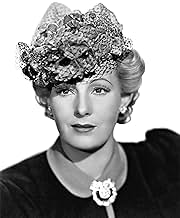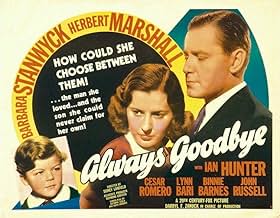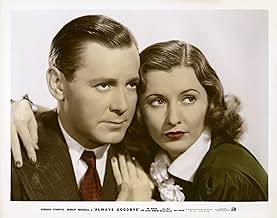Agrega una trama en tu idiomaA woman must decide between two men: one she loves, the other she admires and respects.A woman must decide between two men: one she loves, the other she admires and respects.A woman must decide between two men: one she loves, the other she admires and respects.
- Dirección
- Guionistas
- Elenco
Johnny Russell
- Roddy Weston Marshall
- (as John Russell)
Carol Adams
- Hatcheck Girl
- (sin créditos)
Rafael Alcayde
- Orchestra Leader
- (sin créditos)
Bonnie Bannon
- Model
- (sin créditos)
Katherine Block
- Masseuse
- (sin créditos)
Eugene Borden
- Normandie Purser
- (sin créditos)
Opiniones destacadas
The thirties were a good time for melodrama,par excellence the female movie.In almost all the great melodramas of the era "Imitation of life" and " Only Yesterday" by Stahl or "Mannequin" by Borzage ,the woman realizes she's through with love and she becomes generally a brilliant business woman,be it in the pancakes ,the stock exchange or the chic fashion for selfish ladies who do not think twice when it comes to sending their soon-to-be adoptive child to a military school.
Routine situation in melodrama:Stanwyck's fiancé got run over and she is pregnant by him.In those ancient times,the only solution was to find a family where the child would be fine .But some fine day ,in old France,the mother meets again his little boy.Barbara Stanwyck gives a fine sensitive (and a bit mischievous:the way she gets rid of Jessica is delightful)portrayal .In the end, somehow or other, woman must be prepared to sacrifice something.That's the golden rule of melodrama.
Like this?try these
"The old maid " Edmund Goulding 1939
"To each his own" Mitchell Leisen 1946
Routine situation in melodrama:Stanwyck's fiancé got run over and she is pregnant by him.In those ancient times,the only solution was to find a family where the child would be fine .But some fine day ,in old France,the mother meets again his little boy.Barbara Stanwyck gives a fine sensitive (and a bit mischievous:the way she gets rid of Jessica is delightful)portrayal .In the end, somehow or other, woman must be prepared to sacrifice something.That's the golden rule of melodrama.
Like this?try these
"The old maid " Edmund Goulding 1939
"To each his own" Mitchell Leisen 1946
Barbara Stanwyck stars in this what was termed back in the day, a woman's picture. Always Goodbye is a remake of Ann Harding's Gallant Lady and it has Stanwyck giving up her infant son for adoption rather than trying to raise him as a single parent. That was simply not done back in the day of The Code.
Herbert Marshall arranges the adoption of the infant to his friend Ian Hunter and wife who have been childless for years. Marshall saved Stanwyck from doing herself in. He even arranges for her to get a job in the fashion industry working for Binnie Barnes. As you can imagine the latest in Thirties fashion is worn here. If this were done over at MGM Joan Crawford would have had this part for sure.
While on a buying trip to Paris, Barbara makes the acquaintance of Cesar Romero who provides a lot of the comedy in this film. He also gets a chance to show off his dancing ability which is considerable. Before films Romero was a dance instructor. She also runs into little Johnny Russell who turns out to be her son.
I think you can see where this is going and I will say while it's not the greatest of Stanwyck films it is certainly nicely done. Barbara's best scenes in the film are with little Master Russell. She doesn't let the kid steal them from her either.
In the end STanwyck has to make some critical choices. And finds out that you cannot always have your own way all the time.
Herbert Marshall arranges the adoption of the infant to his friend Ian Hunter and wife who have been childless for years. Marshall saved Stanwyck from doing herself in. He even arranges for her to get a job in the fashion industry working for Binnie Barnes. As you can imagine the latest in Thirties fashion is worn here. If this were done over at MGM Joan Crawford would have had this part for sure.
While on a buying trip to Paris, Barbara makes the acquaintance of Cesar Romero who provides a lot of the comedy in this film. He also gets a chance to show off his dancing ability which is considerable. Before films Romero was a dance instructor. She also runs into little Johnny Russell who turns out to be her son.
I think you can see where this is going and I will say while it's not the greatest of Stanwyck films it is certainly nicely done. Barbara's best scenes in the film are with little Master Russell. She doesn't let the kid steal them from her either.
In the end STanwyck has to make some critical choices. And finds out that you cannot always have your own way all the time.
Really enjoy Barbara Stanwyck and will watch any movie she's in. She can shore up even the most humdrum potboiler with her acting talent and make any picture better. Her mettle was tested in "Always Goodbye", a picture with nothing new to add to the romance genre, and she did the best she could. Alas, she was done in by a flat script and uninspired dialogue and despite an excellent support cast, featuring Herbert Marshall, Ian Hunter, Caesar Romero and Lynn Bari, among others. I'm not sure anything short of a rewrite could save this rehash of many other similarly themed pictures.
This picture was shown in error at Film Forum in NYC; The 1931 film with the same name was supposed to be shown but somehow this was substituted. Right now I would rather have seen the older one. Sight unseen, I'll bet it was better than this plodding trudge through the landscape.
This picture was shown in error at Film Forum in NYC; The 1931 film with the same name was supposed to be shown but somehow this was substituted. Right now I would rather have seen the older one. Sight unseen, I'll bet it was better than this plodding trudge through the landscape.
In Always Goodbye we see Stanwyck create a character that is softer than the more hard-bitten characters she will later become best known for, and she does a great job and is thoroughly enjoyable here. Unfortunately, the film and script (which may have even been dated back in 1938) doesn't hold up nearly as well. It seemed to go on for much longer than it's tidy 75 minutes run time would suggest. Cesar Romero plays a character that brings some pleasant levity to the proceedings but at the same time one can't help but feel that he lays it on just a little too thick. The rest of the supporting cast is fine but mostly forgettable.
Herbert Marshall (HM) is one of my all-time favorite male actors. Barbara Stanwyck (BS) is one of the grand ladies of the golden age of the movies. The dashing Romero overdoes it a bit praising the beauty of every woman he sees and declaring his love to her, but with a little humor you can also accept him, not least because he correctly senses that little Roddy is the real competition for BS's heart, and he is understandably impatient and willing to sideline the kid.
BS plays the field, getting all manner of attention and rich gifts, even a well paying job, but does not appear to go to bed with any of her many suitors - I guess in 1938 that would have not been permitted by the Hays Commission or society's prevailing moral code.
In steps the little boy that BS gave away for adoption at birth and he is just so syrupy that I would gladly spend another night changing my crying children's nappies rather than watch such an excessively cute infant (no wonder Jessica, played by Lynn Bari, wants to flick him off so she can go gold-digging!)
Yet, he holds the key to the Oedipus complex element in this film: BS ditches the man she admits she truly loves (Marshall) to marry Mr. Marshall (Ian Hunter), the fellow who adopted her son. Quite a quid pro quo, in psychiatric context you might say that she actually marries her own son!
You can only wonder how long it will take Mr. Marshall to work out that her heart and mind belong to little Roddy. Seeing BS's reluctance to be bedded by her many attractive suitors, I doubt Mr. Marshall took long to figure it at all - and a divorce would suit Margot (BS) to a T: she'd get her son and half of fabulously rich hubby's wealth to boot!
So you have the makings of a film noir with a happy open ending and a femme who might or not become fatale, but certainly is a mother to reckon with!
Honest opinion? Both HM and BS featured in far more interesting flicks than ALWAYS GOODBYE.
BS plays the field, getting all manner of attention and rich gifts, even a well paying job, but does not appear to go to bed with any of her many suitors - I guess in 1938 that would have not been permitted by the Hays Commission or society's prevailing moral code.
In steps the little boy that BS gave away for adoption at birth and he is just so syrupy that I would gladly spend another night changing my crying children's nappies rather than watch such an excessively cute infant (no wonder Jessica, played by Lynn Bari, wants to flick him off so she can go gold-digging!)
Yet, he holds the key to the Oedipus complex element in this film: BS ditches the man she admits she truly loves (Marshall) to marry Mr. Marshall (Ian Hunter), the fellow who adopted her son. Quite a quid pro quo, in psychiatric context you might say that she actually marries her own son!
You can only wonder how long it will take Mr. Marshall to work out that her heart and mind belong to little Roddy. Seeing BS's reluctance to be bedded by her many attractive suitors, I doubt Mr. Marshall took long to figure it at all - and a divorce would suit Margot (BS) to a T: she'd get her son and half of fabulously rich hubby's wealth to boot!
So you have the makings of a film noir with a happy open ending and a femme who might or not become fatale, but certainly is a mother to reckon with!
Honest opinion? Both HM and BS featured in far more interesting flicks than ALWAYS GOODBYE.
¿Sabías que…?
- TriviaThis film is a remake of 1933's "Gallant Lady" starring Ann Harding in Barbara Stanwyck's role.
- Citas
Count Giovanni 'Gino' Corini: You are the most feminine, the most mysterious, the most beautiful woman I have ever seen. I am in love with you. I fell in love with you at first sight - madly in love.
Margot Weston: That's very flattering but I'm busy.
Count Giovanni 'Gino' Corini: Oh that is nothing; I will wait. I will love you when you are not busy.
- ConexionesRemake of Gallant Lady (1933)
Selecciones populares
Inicia sesión para calificar y agrega a la lista de videos para obtener recomendaciones personalizadas
- How long is Always Goodbye?Con tecnología de Alexa
Detalles
- Tiempo de ejecución
- 1h 15min(75 min)
- Color
- Relación de aspecto
- 1.37 : 1
Contribuir a esta página
Sugiere una edición o agrega el contenido que falta
























